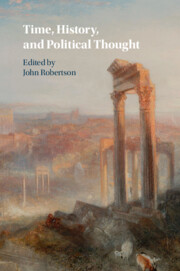Book contents
- Time, History, and Political Thought
- Time, History, and Political Thought
- Copyright page
- Contents
- Contributors
- Acknowledgements
- Note on References and the Bibliography
- Introduction: Time, History, and Political Thought
- 1 Out of Time? Eternity, Christology, and Justinianic Law
- 2 Historicity and Universality in Roman Law before 1600
- 3 ‘The Logic of Authority, and the Logic of Evidence’
- 4 Christian Time and the Commonwealth in Early Modern Political Thought
- 5 Politic History
- 6 Hobbes on the Theology and Politics of Time
- 7 The Recourse to Sacred History before the Enlightenment: Spinoza’s Theological–Political Treatise
- 8 Law, Chronology, and Scottish Conjectural History
- 9 Civilization and Perfectibility: Conflicting Views of the History of Humankind?
- 10 Kant on History, or Theodicy for Mortal Gods
- 11 Law’s Histories in Post-Napoleonic Germany
- 12 After Historicism: The Politics of Time and History in Twentieth-Century Germany
- 13 The Right to Rebel: History and Universality in the Political Thought of the Algerian Revolution
- Bibliography
- Index
10 - Kant on History, or Theodicy for Mortal Gods
Published online by Cambridge University Press: 08 June 2023
- Time, History, and Political Thought
- Time, History, and Political Thought
- Copyright page
- Contents
- Contributors
- Acknowledgements
- Note on References and the Bibliography
- Introduction: Time, History, and Political Thought
- 1 Out of Time? Eternity, Christology, and Justinianic Law
- 2 Historicity and Universality in Roman Law before 1600
- 3 ‘The Logic of Authority, and the Logic of Evidence’
- 4 Christian Time and the Commonwealth in Early Modern Political Thought
- 5 Politic History
- 6 Hobbes on the Theology and Politics of Time
- 7 The Recourse to Sacred History before the Enlightenment: Spinoza’s Theological–Political Treatise
- 8 Law, Chronology, and Scottish Conjectural History
- 9 Civilization and Perfectibility: Conflicting Views of the History of Humankind?
- 10 Kant on History, or Theodicy for Mortal Gods
- 11 Law’s Histories in Post-Napoleonic Germany
- 12 After Historicism: The Politics of Time and History in Twentieth-Century Germany
- 13 The Right to Rebel: History and Universality in the Political Thought of the Algerian Revolution
- Bibliography
- Index
Summary
In this chapter Chris Meckstroth explains how Immanuel Kant responded to the urgent political question of the 1780s and 1790s, how to understand the collective agency of the people or nation, with a novel conception of history. Kant thought we must believe progress is possible if we are to sustain a commitment to acting justly. To this end he re-worked arguments of Leibniz and Pope, who had tried to show that we live in the best of all possible worlds, thereby absolving God of responsibility for evil and saving the coherence of moral duty from scepticism. Kant, however, did not pitch his argument to the religious conscience of individuals. He aimed at political rulers whose authority derived from representing the general will of an entire people. His political thought focussed on principles a ruler must respect to count as that sort of representative. To these his philosophy of history added a concern for improvement over time, which he made plausible by drawing on a mechanism of unsocial sociability familiar in authors such as Pope. The result was a new, secular theodicy of progress favouring peace and republican politics, and designed to contain conflict in an age of democratic reform.
Keywords
- Type
- Chapter
- Information
- Time, History, and Political Thought , pp. 216 - 236Publisher: Cambridge University PressPrint publication year: 2023

